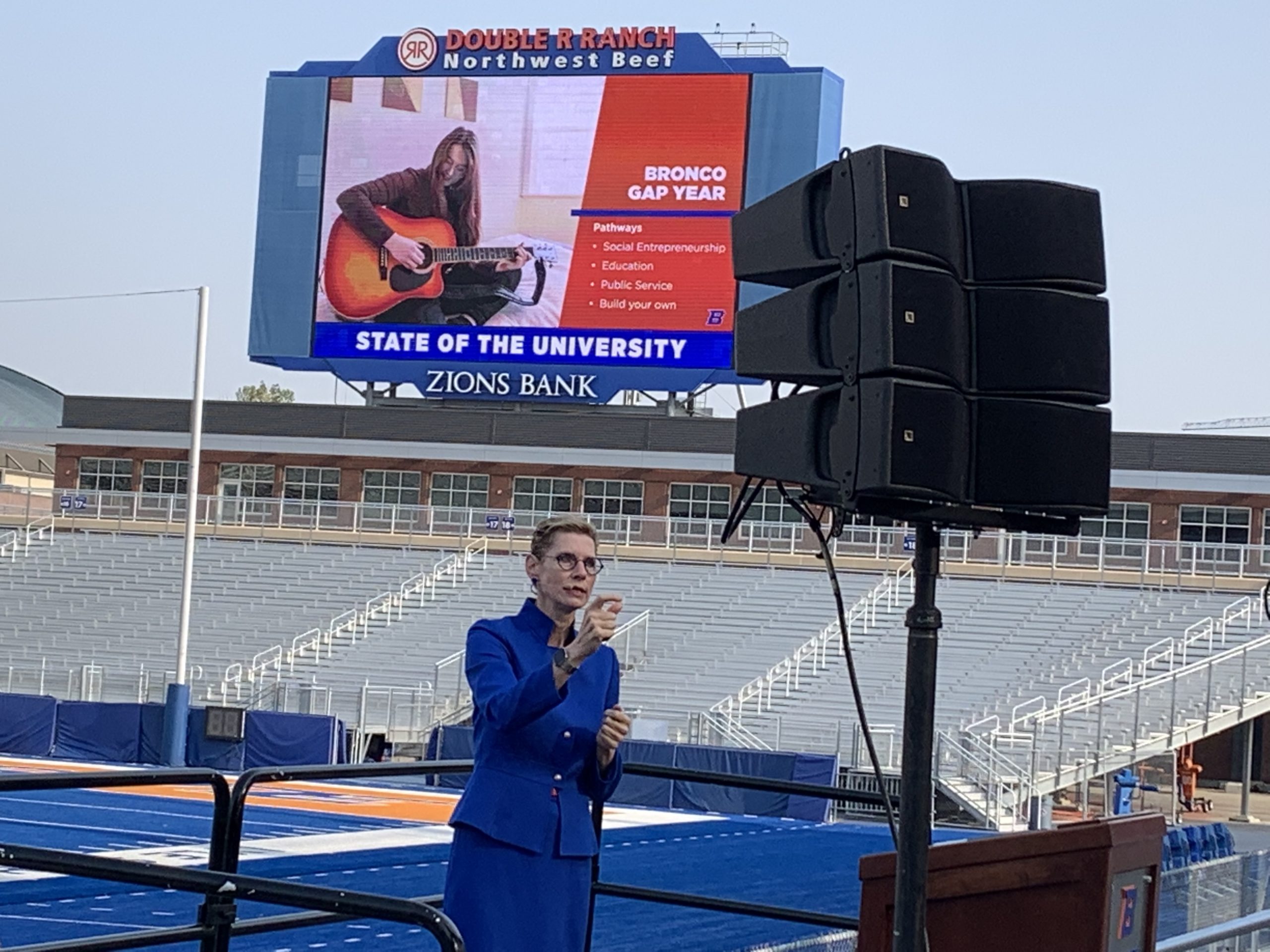Marlene Tromp welcomed Boise State University staff and students to Albertsons Stadium Wednesday for a pregame pep talk of sorts.
The president’s third State of the University address was short on announcements — and sidestepped the political battles that have marked Tromp’s 26 months at Boise State.
Instead, the setting and the substance were geared toward one theme: celebrating the university’s work during the pandemic, and amping up the university community for the challenges that await in 2021-22.
“We will teach, and we will research and we will serve,” Tromp told a masked audience, filling several sections of the football stadium’s east stands.
With Boise State’s trademark blue turf as a backdrop, Tromp gave her 40-minute speech a gameday feel. She urged the attendees to cheer for faculty members who navigated the 2020-21 school year — and essential workers who stayed on campus through the pandemic. The stadium’s end zone jumbotron was used not for replays but for recaps — slides highlighting facts and stats about Boise State’s academics and community impact. And after the speech, Boise State’s Blue Thunder marching band and cheerleaders led the crowd in the school’s fight song.
Rallying around accomplishments from 2020-21, Tromp also spelled out goals for the future:
She touted Boise State’s growing research portfolio. The university landed $58 million in research projects in 2020-21, up 58 percent from five years ago. And she said Boise State will work to connect research projects with students and student success.
The university raised $500,000 for its True Blue scholarship program and shifted an additional $1 million into scholarships, she said. Student aid will be a cornerstone of future fundraising efforts. “We don’t want finances to be a barrier to students.”
She listed Boise State’s rural Community Impact Program as another success story. The pilot program lined up remote students in McCall, Mountain Home and Payette with faculty mentors. In those three rural communities, enrollment increased by up to 28 percent, even outside the remote pilot program. Those increases ran counter to overall declines in rural enrollment — and, she said, illustrate the value of rural outreach.
Tromp received a round of applause as she again talked up a new initiative, the Institute for Advancing American Values, which will launch this fall. The program — supported through a donation from an unnamed Idaho philanthropist — is designed to bring together people from across the ideological spectrum, to discuss shared values and shared problems.
“Haven’t we seen too little dialogue in the past two years?” Tromp asked.
But that was about as political as Wednesday’s speech got. And that was a marked departure from August 2020, when Tromp urged staff and faculty to win back higher education’s critics by pointing to the work they do.
And when it came time to recognize political dignitaries, Tromp took an apolitical tack. She introduced five legislators in attendance — Boise Democratic Reps. Ilana Rubel, Steve Berch, John Gannon and Chris Mathias, and Sen. Carl Crabtree, R-Grangeville.
What went unmentioned was the fact that Crabtree, a member of the budget-writing Joint Finance-Appropriations Committee, played a pivotal role in passing a higher education budget that cut $1.5 million from Boise State, and $500,000 apiece from the University of Idaho and Idaho State University. Crabtree said the cuts were designed to “send a message” about left-leaning social justice programs; they angered higher education advocates but also disappointed hardline conservatives seeking deeper cuts.
More coverage from Wednesday’s speech from Don Day of BoiseDev.com.
Republish this article on your website
You may also be interested in
